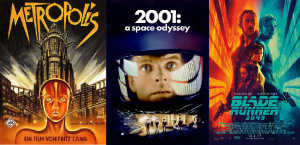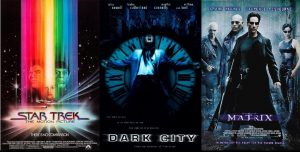
Since the 1970s — and especially the mid-1990s — as part of the genre that is uniquely situated to address the prevalence of alienation in the modern world, and to pursue “intentional estrangement” as a strategy to promote a new kind of knowledge (Darko Suvin), science fiction has produced an increasingly pertinent and compelling number of films and television series that draw attention to, illustrate, and directly comment on the contradictions of the modern world, its dissemination of — and reliance on — experiences of cognitive dissonance, and the destructive character of the dominant mode of resource extraction, and economic production and distribution.
In addition to such classics as Metropolis (1927; Fritz Lang), The Day the Earth Stood Still (1951; Robert Wise), 2001: A Space Odyssey (1968; Stanley Kubrick), and Solaris (1972; Andrei Tarkovsky), examples include Soylent Green (1971; Richard Fleischer), Stalker (1979; Andrei Tarkovsky), Blade Runner (1982; Ridley Scott), Dark City (1998; Alex Proyas), The Matrix (1999; The Wachowskis), Minority Report (2002; Steven Spielberg), Solaris (2002; Steven Soderbergh), Serenity (2005; Joss Whedon), Children of Men (2006; Alfonso Cuarón), I Am Legend (2007; Francis Lawrence), District 9 (2009; Neill Blomkamp), Moon (2009; Duncan Jones), Another Earth (2011; Mike Cahill), Melancholia (2011; Lars von Trier), Cloud Atlas (2012; Wachowskis and Tom Tyker), Oblivion (2013; Joseph Kosinski), Her (2013; Spike Jonze), Interstellar (2014; Christopher Nolan), Ex Machina (2014; Alex Garland), Edge of Tomorrow (2014; Doug Liman), Mad Max: Fury Road (2015; George Miller), Arrival (2016; Denis Villeneuve), and Blade Runner 2049 (2017; Denis Villeneuve).
In many of these films, the theme of “love” is addressed as a cypher for qualitative social transformations, especially with regard to the largely regressive system of social relations that co-emerged with modern society, and is still in place today. This page — in non-exclusive fashion — draws attention to how science-fiction films and television series, such as Star Trek: The Next Generation (1987-1994), Firefly (2002-3), Battlestar Galactica (2003-2009), Westworld (2016-), and many others, constitute critiques of the existing system of social relations and how it impedes the ability of both humans and humankind to move toward the next level of evolution — socially, culturally, intellectually, morally, politically, and especially economically.
This page brings together work on some of the sociologically and social-theoretically most intriguing and powerful films, by both established scholars and current and former students. These essays are not simply “about” various films; rather, they employ science-fiction film in general, and specific films in particular, as jumping-off points and as reference frames for sociologically and/or social-theoretically focused analyses and insights that recognize that (and how) films in science fiction constitute a specific kind of cinematic aesthetic, with its own modes, material, and forms of messaging.
___________________________________________________________
2020
Harry F. Dahms
“Critical Theory, Sociology, and Science-Fiction Films:
Love, Radical Transformation and the Socio-Logic of Capital,”
in Daniel Krier and Mark Worrell (eds.), Capital in the Mirror: Critical Theory and the Aesthetic Dimension (Albany, NY: SUNY Press; 2020): 231-301. — Includes discussion of Star Trek: The Motion Picture (1979; Robert Wise), Dark City (1998; Alex Proyas), and The Matrix (1999; The Wachowskis).

2020
Harry F. Dahms
“Science Fiction Films and ‘Love’:
Toward a Critique of Regressive Social Relations”
in: Soundings: An Interdisciplinary Journal 103 (2) 2020: 121-157 (special issue on social theory and science fiction; guest-edited by author). — Includes discussion of Interstellar (2014; Christopher Nolan) and Arrival (2016; Denis Villeneuve).

2020
Lawrence Hazelrigg
“Efficacy and Efficiency in the World
of Terry Gilliam’s Brazil“
in: Soundings: An Interdisciplinary Journal 103 (2) 2020, pp. 158-183. (special issue on social theory and science fiction).
2019
Lawrence Hazelrigg
“’How Can [We] Not Know?’
Blade Runner as Cinematic Landmark in Critical Thought”
in: The Challenge of Progress: Theory between Critique and Ideology (Current Perspectives in Social Theory, 36), ed. Harry F. Dahms (Bingley, UK: Emerald, 2019), pp. 111-132.

2013
Rachel Reed
“Being the One is Like Being in Love:
Breaking the Bonds of Patriarchy”
%2B5.jpg&f=1&nofb=1)
2012
Harry F. Dahms
“Decoding Modern Society:
The Matrix Trilogy and the Realm of Alienation”
in: Cinematic Sociology. Social Life in Film (2nd ed.), ed. J.-A. Sutherland and K. Feltey (Thousand Oaks: Sage, 2012), pp. 42-54.
